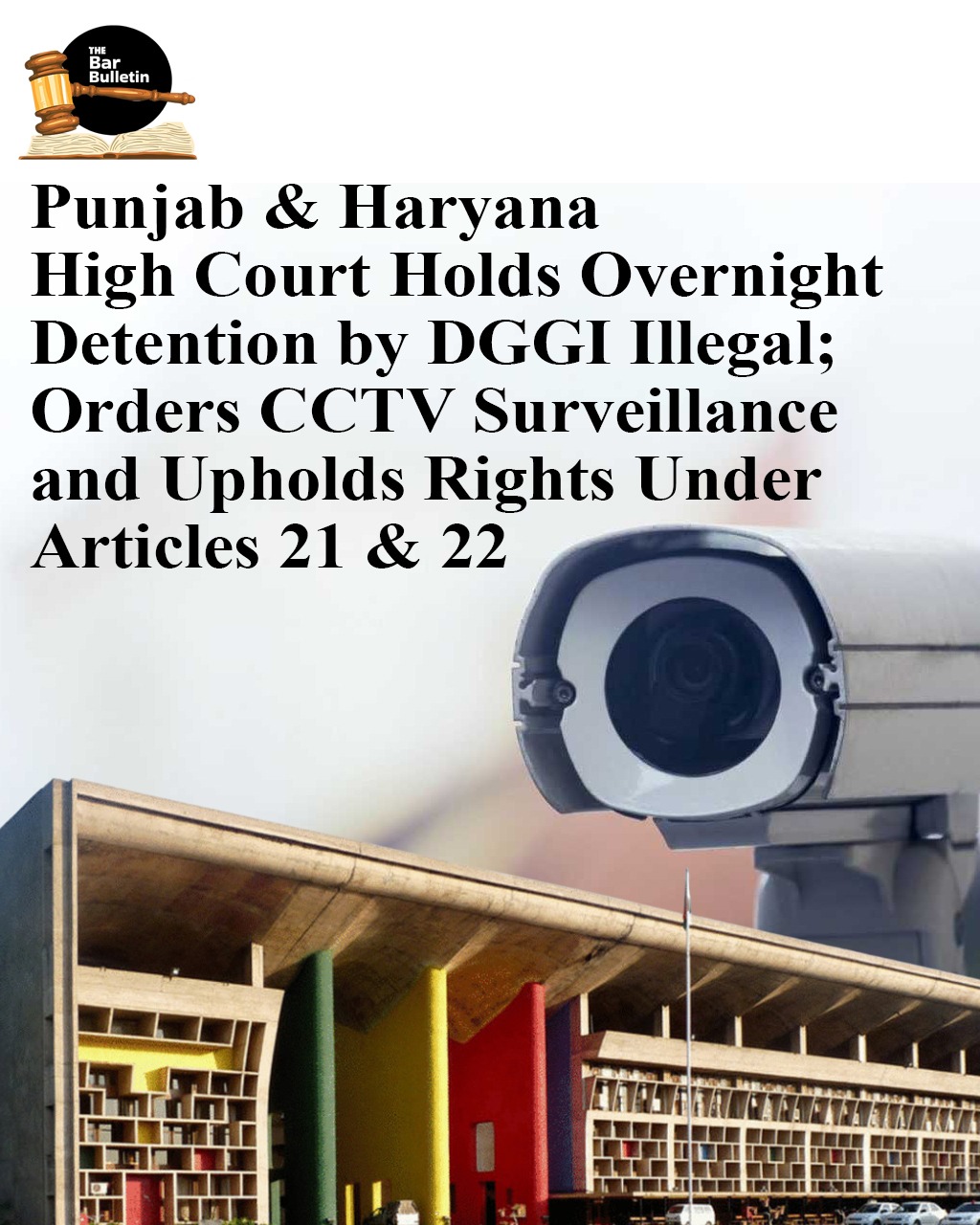Reprimanding the DGGI officials for their failure to supply the detenue with the ‘reasons to believe’ that he has committed an offence under the CGST Act, necessitating his arrest, the Punjab and Haryana High Court declared the arrest of the detenue as illegal and non-est in the eyes of law. The Court therefore ruled that the statement of any person summoned by the DGGI must be recorded during office hours, and the person so summoned is well within his rights to record his statement in the presence of his counsel. Additionally, any person summoned to the DGGI may request their statement to be recorded under CCTV surveillance.
The High Court also held that a prolonged restraint and detention for an indefinite time, restricting free movement and personal liberty, ought to be construed as an arrest in the absence of authorization under Section 69 of the CGST Act, and since the detenue was held in informal custody for an indefinite period, he is entitled to the protections available under Articles 21 and 22 of the Constitution of India.
While explaining that time and again, the constitutional Courts have come to the aid of those victimized by the weaponisation of criminal law, even by state-run agencies, and it goes unsaid that an arrest is a rather overt act that significantly impacts how society views the arrestee, the High Court observed that multiple procedural safeguards were necessarily put in place by the Legislature as well as the Judiciary to ensure that arrests are not mechanically made.
Aghast by the premature action of the DGGI officials to entertain the idea of arrest, let alone justify it, in the absence of a cognizable offence, the Single Judge Bench of Justice Harpreet Singh Brar observed that there were no justifiable reasons to condone keeping the detenue in the zonal office for over 30 hours, when curiously, a prima facie cognizable offence was yet to be made out against the detenue, and then also he was kept in the zonal office overnight and subjected to prolonged interrogation. The Bench pointed out that the detenue, a family man, would not voluntarily subject himself to such treatment, when only data had been extracted from his laptop for forensic analysis.
The Single Judge went on to observe that the very fact that the DGGI officials do possess the power to arrest is sufficient to induce a sense of fear and inhibition in the mind of the detenue, making the matter at hand a prime example of psychological coercion, and the unspoken threat that leaving without permission would be met with immediate restraint and give rise to adverse consequences ensures that the detenue does not believe that exercising his fundamental rights is a real option.
Briefly, in June this year, the petitioner had sought Habeas Corpus for recovery of her husband (detenue) from the illegal custody of the Department and to hand him over to the petitioner and his family members or, in the alternative, appoint a Warrant Officer for this purpose. The High Court, accepting it, appointed a Warrant Officer to inspect the premises of Department Officials to secure the release of the detenue, and take appropriate steps to secure his release if he was found to be in illegal detention. Thereafter, the High Court passed another order directing the ADG, DGSTI to file his affidavit indicating complete details regarding names of the officials of the Department along with their designations, who were present at Central Revenue Building, as well as the stratus of installation of CCTV cameras at the premises of Central Revenue Building, Chandigarh following the judgment rendered by the Supreme Court in Paramvir Singh Saini vs. Baljit Singh, (2021) 1 SCC 184. The Court also directed that the original record, including the arrest memos and ground of arrest as well as the medical examination report of the detenue, be produced on the next date of hearing, i.e., July 18, 2025.
It’s the date of the next hearing, i.e., July 18, 2025, and the High Court is at pains to note the requisite record has not been produced despite specific directions to this effect. As far as the affidavit of the ADG that cameras installed on the premises of the Central Revenue Building are intermittently non-functional due to some ongoing construction work, the Court found this explanation incongruous, as all the electronic and digital resources of the zonal office, including the E-office portal, were fully functional.
Further, finding that the designated officer merely gave authorization on the ipse dixit of the Intelligence Officer who forwarded the proposal to arrest through the E-office portal, which is mechanical and does not reflect application of mind, the Court concluded that the failure to follow the drill mandated by law while granting authorization to arrest certainly vitiates the arrest as it suffers from an incurable illegality. The High Court therefore listed the matter for hearing on July 30, 2025 for further consideration of the issue revolving obstruction caused to the Warrant Officer appointed by this Court as well as for release of the detenue in question.
Appearances:
Senior Advocate Vinod Ghai, and Advocates Arnav Ghai and R.S. Bagga, for the Petitioners
Advocates Manish Bansal and Viren Sibal, for the Respondent No.1
Addl. Public Prosecutor, U.T., Chandigarh.
ASG Satya Pal Jain, and Advocates Rajesh Sethi, Sourabh Goel, Anshuman Sethi, Geetika Sharma, Anju Bansal, and Deify Jindal, for Respondent Nos 2 & 3
Advocates Sidhi Bansal, Ridhi Bansal, and Viney Kumar, for CBIC

